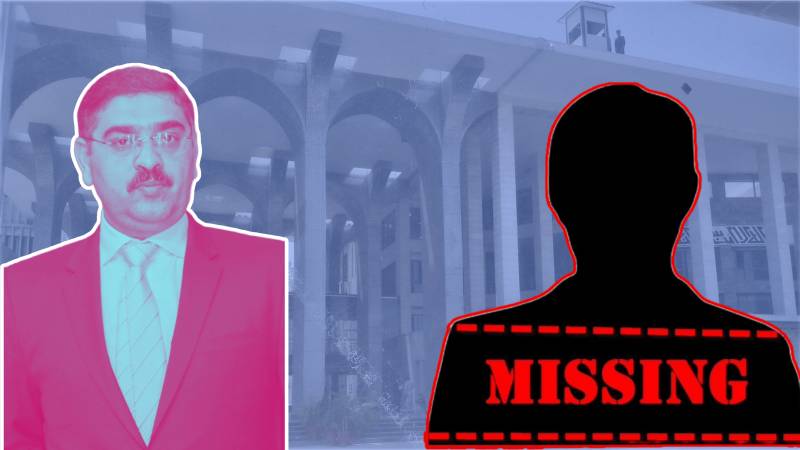
Caretaker Prime Minister Anwaarul Haq Kakar on Wednesday struck a defiant tone as he appeared before the Islamabad High Court (IHC) over the issue of missing persons, asking whether human rights organisations criticise non-state actors perpetrating acts of terrorism just like they criticise state institutions over enforced disappearances.
The premier, who hails from the troubled province of Balochistan, recalled a three-month-old incident where people were set on fire on the Coastal Highway as he contended that people are being killed based on linguistic discrimination, but everyone remains silent on that.
The caretaker premier on Wednesday pleaded the state's case in person before IHC's Justice Mohsin Akhtar Kayani, who had resumed hearing on the alleged enforced disappearance of missing Baloch students and implementation of recommendations from the Commission of Inquiry on Enforced Disappearances.
Kakar appeared before the court after the third summon for his appearance had been issued. Caretaker Interior Minister Gohar Ijaz accompanied him along with Attorney General of Pakistan Mansoor Usman Awan.
Delivering a loud and clear message, Kakar told the court that whether the non-state actors involved were the Tehreek-e-Taliban Pakistan (TTP) or any other outfit, they were all violating human rights.
He further asserted that neither this court, the attorney general, or Imaan Zainab Mazari-Hazir, the counsel for one of the petitioners, could allow an armed struggle to continue.
During the hearing, the caretaker prime minister revealed that the government had been pleading with the protesters to provide them with the names of the missing persons. Kakar reiterated that his government had tried its best to resolve the issue but questioned on what basis the matter could be concluded when there is no evidence.
Emphasising that Wednesday's hearing was the 26th of the case, Justice Kayani asked whether the caretaker prime minister had reviewed the case records.
Justice Kayani reminded the caretaker prime minister that state institutions are not above the law and that the latter's appearance before the court proved that he, too, was answerable to the law.
IHC's Justice Kayani lamented that students across Pakistan are being picked up, and if some reports are to be believed, some are going to Afghanistan [and] some are joining the TTP.
He further observed that at least nine people were picked up by the Counter-Terrorism Department (CTD), and a few people were released on court orders, adding that the agencies cleared the missing persons of the charges and released them.
The caretaker prime minister retorted that all are not only answerable under the Constitution, but are also bound to work within it. He said that he is well aware of the situation in Balochistan, adding that they are facing an "armed struggle" in the province.
He, however, questioned whether he would approach the United Nations for safety for his life or if he would ask the state of Pakistan and its courts for protection. The interim prime minister said the government brought 600 non-state actors into the national stream.
Justice Kayani, however, inquired about the number of people who were punished after being picked up, further observing that the law is equal for thieves, dacoits and terrorists. The judge noted that it is the state's and its institutions' failure that people are not produced before the courts.
Regarding terrorism, the caretaker prime minister pointed to how people are being offloaded from buses and asked about their names to kill them.
"They make people board off buses and ask for their names and kill Chaudhrys and Gujjars," said Kakar.
He, however, admitted that there were flaws in the system.
"If there is no evidence, then who do we sentence and how?" the premier asked, further apprising the court that around 90,000 people have been martyred in the country due to terrorism, but not even 90 people have been punished.
"If we ask about missing persons, they only give 5,000 names," he said, accusing families of missing persons of not showing a desire to resolve the issue.
Kakar argued that it is not appropriate to consider the entire state as criminal.
Justice Kayani remarked that no court could grant protection to anti-state elements. But the judge asked the caretaker prime minister whether the latter could legislate on the matter. The caretaker prime minister responded that he could not, but a new Parliament could and called on elected political parties to come forward to resolve the issue.
He further informed the court that state institutions have made great sacrifices and that security personnel are martyred daily.
During the hearing, Justice Kayani observed that only the police have the competent authority to file a case, noting that the courts in this country have sentenced terrorists. He further remarked that it is mandatory to produce all those people before the court who law enforcement agencies have picked up.
During the hearing, the court asked the attorney general whether there were others, apart from the ones included in the previous list, who were missing.
The court also asked Advocate Imaan Zainab Mazari-Hazir, the counsel for one of the petitioners, to cross-check the AGP's figures with her list.
Mazari sought details of those missing persons against whom first information reports were registered.
The court later adjourned further hearings of the case.

